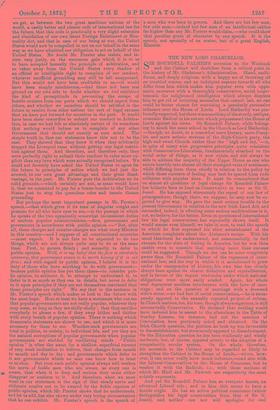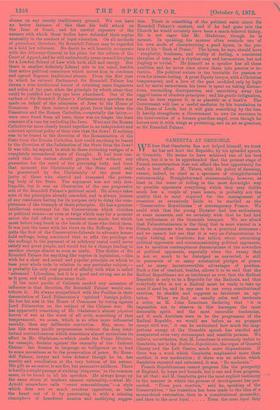proceeding. primogeniture, though there, we suppose, he may now be
ex-
Bat perhaps the most important passage in Mr. Forster's pected to give way. He gave the most serious trouble to the speech,—that which gives it its tone of singular weight and present Government in relation to the new Irish Land Act, and promise for all who have eyes to see,—is the passage in which succeeded, indeed, in effecting some serious modifications in it, he speaks of the two apparently somewhat inconsistent duties not, we believe, for the better. Even on questions of international of modern popular administrations,—firm government and law his legal conservatism has repeatedly shown itself. It -abuses on any merely traditionary ground. We can have no better instance of this than his bold attack on the Inns of Court, and his careful exposure of the -excuses with which those bodies have defended their supine neutrality in the conduct of legal education. On all methods of procedure, therefore, Sir Bounden Palmer may be regarded as a bold law reformer. No doubt he will heartily co-operate with the Attorney-General in his plans for the reform of the Court of Appeal, and he will undoubtedly press onward his plans for a London School of Law with both skill and energy. But there is another definitely Liberal side to his mind, besides that active political conscience which moves him to condemn and uproot flagrant traditional abuses. From the first year in which he entered Parliament, Sir Roundell Palmer has shown a wise intellectual horror of retaining mere fragments and relics of the past, When the principle by which alone they could be justified has long ago been abandoned. One of the earliest of Sir Roundell Palmer's Parliamentary speeches was made on behalf of the admission of Jews to the House of Commons. He then insisted with great force that when the Dissenters and the Roman Catholics,—especially the latter,— were once freed from all tests, there was no longer the least remnant of a case for excluding the Jews. Were not the Roman Catholics far more closely bound together in an independent and coherent spiritual polity of their own than the Jews? If nothing was to be feared in the direction of the Romanisation of the State from the Roman Catholics, how could anything be feared in the direction of the Judaisation of the State from the Jews? It was idle, he argued, to stick to these irritating vestiges of a completely surrendered state of thought. It had been con- ceded that the nation should govern itself without any guarantee for the creed of the governing body, and from that moment the Christianity of the State could only be guaranteed by the Christianity of the great ma-. jority of those who elected and composed the govern- ing body of the State. The argument was not only irre- fragable, but it was an illustration of the one progressive side of Sir Roundell Palmer's political mind. He always takes note of the principles already conceded, and is always jealous of any resistance having for its purpose only to delay the com- pleteness of the triumph of those principles. He has a genuine intellectual contempt for the Conservatism which clutches at political straws—or even at twigs which may for a moment arrest the full effect of a concession once made, but which must before long break in the hands of those who clutch them. It was just the same with his views on the Suffrage. He was quite the first of the Conservative-Liberals to advocate house- hold suffrage, being convinced that to affix the privilege of the suffrage to the payment of an arbitrary rental could never satisfy any great people, and would but be a change leading to another change almost as soon as made. This dislike of Sir Roundell Palmer for anything like caprice in legislation,—this wish for a clear and sound and popular principle on which to base your whole code in relation to any particular subject,— is probably his only real ground of affinity with what is called 'advanced' Liberalism, but it is a good and strong one so far as it goes, and will produce some fruit.
If the most pacific of Cabinets needed any accession of influence in that direction, Sir Roundell Palmer would con- tribute it. He always sympathised with the Peelites in their denunciation of Lord Palmerston's 'spirited' foreign policy. He lost his seat in the House of Commons by voting against Lord Palmerston on the subject of the Chinese war. He has apparently something of Mr. Gladstone's almost physical horror of war as the worst of all evils, something of that temperament, we mean, which is so often more influential morally, than any deliberate conviction. Nay, more, he has this warm pacific prepossession without the deep intel- lectual contentiousness which sometimes almost neutralises its effect in Mr. Gladstone,—which made the Prime Minister, for example, declaim against the enormity of the 'Indirect Claims' last Session in language so belligerent as to lead to some uneasiness as to the preservation of peace. Sir Roan- dell Palmer, lawyer and born debater though he be, has suavity and conciliation at the very bottom of his nature. His gift as an orator, is not fire, but persuasive mildness. There is hardly a single'passage of striking 'eloquence,' in the common sense, to be found in all his speeches. He always keeps up the same strain of lambent earnest rationality,—what Mr. Arnold somewhere calls "sweet reasonableness,"—a style which does not so much overbear opposition, as take the heart out of it by penetrating it with a relaxing atmosphere of beneficent suasion and mollifying sugges- lion. There is something of the political saint about Sir Roundel!. Palmer's manner, and if he had gone into the Church he would certainly have been a much-beloved bishop. He is not eager like Mr. Gladstone, though he is earnest. In speaking, his manner often reminds one of his own mode of characterising a good hymn, in the pre- face to his "Book of Praise." The hymn, he says, should have "simplicity, freshness, and reality of feeling, a consistent elevation of tone, and a rhythm easy and harmonious, but not jingling or triviaL" He himself as a speaker has all these qualities, and he never rises above them into passion or in- vective. His political nature is too tractable for passion or even for intense feeling. A great Equity lawyer, with a Christian temperament, and a love of the past modified only by logic and by moral earnestness, his force is spent on taking distinc- tions, reconciling discrepancies, and smoothing away the ragged traces of obsolete principles ; and his gentle indignation, when he does express it, is as placable as a lamb's. The Government will lose a useful mediator by his translation to the House of Lords, bat it will gain something by the loss. It hardly strengthens a Government to owe its successes to the intervention of a human guardian angel, even though he hovers over it with wings as protecting, and an air as gracious, as Sir Roundell Palmer.



































 Previous page
Previous page